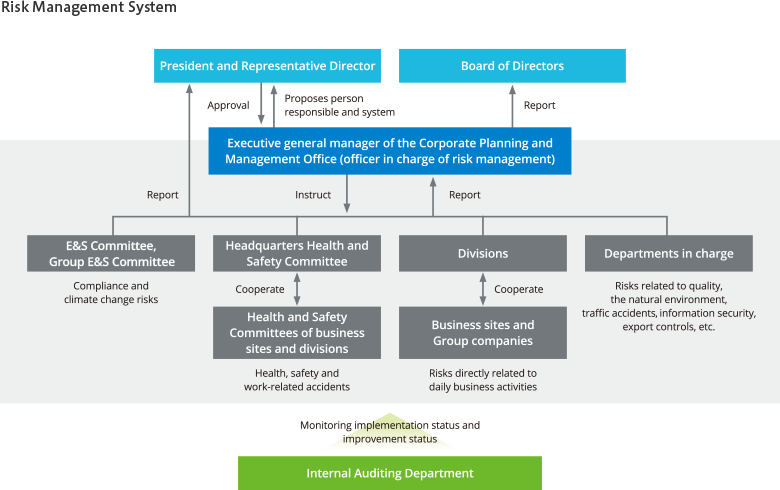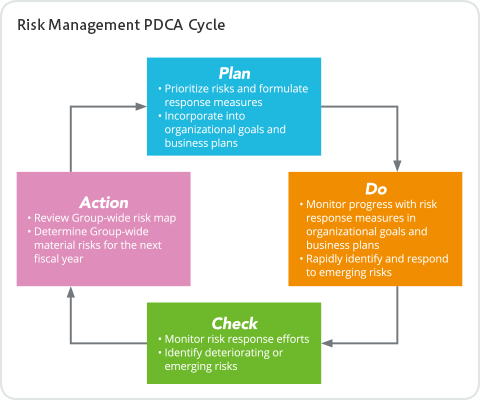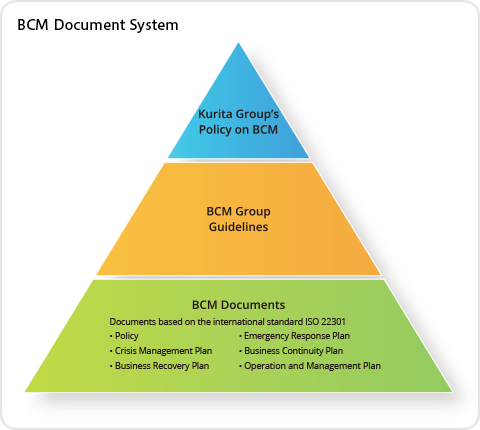The Kurita Group Approach
The Kurita Group defines risk as any event that makes its sustainable growth and enhancement of the Group’s corporate value uncertain. Because the Group’s decision-making tends toward risk avoidance, we are working to prevent missed opportunities for business growth by clarifying risks that should be taken for the sake of sustainable growth and enhancing corporate value while implementing appropriate measures to reduce losses.
Risk Management System
The executive general manager of the Corporate Planning and Management Office is responsible for monitoring risks and implementing risk management in the Kurita Group. The executive general manager regularly analyzes and evaluates the Group’s risks and conducts ongoing monitoring based on the Group-wide risk map, as well as takes steps to prevent risks from occurring. In the event of a risk that could have a serious impact on Kurita’s business, the executive general manager formulates systems with those responsible for responding to the risk, obtains approval from the president and the representative director, and immediately issues instructions. Those responsible for responding to the risk promptly take action and report to the president and the representative director and the executive general manager of the Corporate Planning and Management Office regarding the impact of the risk, progress with mitigation and measures to prevent reoccurrence. The E&S Committee is responsible for tackling material risks related to compliance and climate change, while the chairperson of the Headquarters Health and Safety Committee is responsible for material risks related to health, safety and work-related accidents. The executive general manager of each division is responsible for responding to risks directly associated with day-to-day business operations, and each division identifies and evaluates risks related to the operations and Group companies it is in charge of. Also, responding to risks relating to quality, the natural environment, traffic accidents, information security, export controls, and so on are handled by the respective departments responsible. The executive general manager of the Corporate Planning and Management Office, the chairperson of each committee and the executive general manager of each division report periodically to the Board of Directors on the status of risk management implementation, and report as necessary to the Board of Directors on the occurrence and impact of material risks. Furthermore, the Internal Auditing Department monitors the execution status and improvement status of risk management measures.
Identifying Risks and Formulating Response Measures
The Kurita Group uses a Group-wide risk map to identify potential risks in its business activities and assess risks against monitoring benchmarks. The Kurita Group also determines material risks for the Group based on the expected impact of those risks and the likelihood of them occurring. Material risks are mapped for each division, and divisions devise response measures, incorporate them into business plans and manage progress, including at Group companies. Progress is regularly reported to the Board of Directors, which discusses and formulates material risk and response measures for the next fiscal year, including responses to emerging risks caused by changes in the operating environment. In the fiscal year ending March 2023, among high-impact risks with a strong chance of materializing, country risk, including the impact of U.S.-China trade friction and conflict, and disaster risks, including the COVID-19 pandemic, which shows no sign of subsiding yet, are being classified as risks requiring close monitoring, and we are planning to strengthen our response to them.
Groupwide Risk Map
| Risk category | Main risks |
|---|---|
| Operating environment risk |
|
| Country risk |
|
| Disaster risk |
|
| Strategic risk |
|
| Business risk |
|
| Financial risk |
|
| Labor risk |
|
| Legal and compliance risk |
|
- ・The above table is not an exhaustive list of the Kurita Group’s risks.
- ・Please click on the link below for more details about risk factors related to the Group’s business conditions, financial accounts and other items in the Annual Securities Report that could have a material impact on investor decisions.
Business Continuity Management (BCM)
Approach and System for BCM Activities
The Kurita Group is taking steps to prepare for sudden unexpected events such as a
major earthquake, natural disaster, or pandemic from the perspective of both
“ensuring employee safety” and “business continuity.” We have established an order
of priority for business and standards for decision making and action when an event
occurs, as well as response policies, procedures, systems, and so forth. In
addition, during normal times we engage in management activities, such as
formulating, maintaining, and updating plans in preparation for states of emergency,
securing budgets and resources, implementing countermeasures, and conducting
education and training, as well as inspections and so forth.
The Kurita Group’s Policy on BCM was formulated in 2018 and sets out a basic policy
which stipulates that the first priority if an event occurs is ensuring the safety
of employees’ lives, and having ensured their safety, the Company is to work to
quickly recover business operations and support local communities. To guide officers
and employees to take appropriate decisions and actions if an event occurs, the
Company has also prepared a system of documentation comprising the Kurita Group’s
Policy on BCM, the BCM Group Guidelines, which complements the policy, and BCM
Documents based on the framework of the international standard for BCM, ISO 22301.
The Company started implementing the system in the fiscal year ending March 31,
2023.
BCM Basic Policy
| Highest Priority on Ensuring the Safety of Humans | Early Recovery of Business | Community Support |
|---|---|---|
| We will place highest priority on ensuring the peace of mind and safety of the officers and employees as well as their family members. | We will endeavor to quickly restore operations at the company’s own facilities, completed properties and properties under construction, etc. In this way, it will make efforts to supply products and services in a stable manner and to support customers’ recovery efforts. | While making efforts to prevent secondary disasters at its own sites, we will support the reconstruction of the local community. |
BCM Document System
Initiatives to Strengthen BCM Activities
The Group’s BCM activities to date have mainly focused on initiatives for ensuring
employee safety and disaster countermeasures at manufacturing sites. From the fiscal
year ended March 31, 2021, we have established a new approach to the order of
priority and items to be implemented for business continuity based on the
international standard ISO 22301 framework, and we have been working to rebuild and
strengthen our BCM functions.
In the fiscal year ended March 31, 2022, we took steps to increase the quality and
speed of communications in our initial response to an incident by redefining the
information on the disaster status that needs to be gathered for determining the
establishment of a Disaster Response Headquarters and the reporting structure. From
a perspective of business continuity, we surveyed customers involved with social
infrastructure and customers to whom we supply ultrapure water regarding their level
of expectation for the Group’s restoration of operations after an event, and
developed an “event response model” for each customer, specifying a vertically
integrated response procedure for sales, engineering, Group companies, and partner
companies and the necessary resources.
To ensure the safety of the Company’s employees and strengthen its initial response
capabilities, we aimed to increase each employee’s knowledge and awareness of
disaster readiness by conducting online visual disaster readiness training for all
employees to prepare for a disaster occurring while they are working at home. We
also conduct regular safety reporting training based on the scenario of a major
earthquake, or storm and flood damage, and took steps to establish rapid initial
response activities.
In the fiscal year ended March 31, 2023, we will work to establish the operations of
the BCM Documents and increase their effectiveness by promoting internal awareness
of the BCM Documents and conducting education and training by position and job type.
We will also define the scope of deployment for the event response model for each
customer and expand our initiatives. Furthermore, to improve business continuity
functions throughout the supply chain, we will strengthen initiatives for rapid
recovery of our own manufacturing sites and links with partner companies.
Overseas, we will share BCM Documents formulated in Japan with our Group companies
and formulate BCM Documents to address the inherent risks and business
characteristics of each country and region by conducting local surveys. We will also
work to establish a global reporting system to use when an event occurs.
Response to the COVID-19 Pandemic
The Group aims to respond as a Group to risks arising from people voluntarily staying at home and office attendance being restricted due to the spread of COVID-19; for example, reduced operating efficiency, delays in business model development, and stagnation in business activities (order reception, manufacturing and supply). The Group has built backup systems for the case in which an executive involved in business execution or a manager responsible for a business division contracts COVID-19, and we have also established reporting channels for Group companies through which we work to quickly gather accurate information. In addition, we have defined work processes in each organization that ensure business continuity for customers and the Group, or that meet societal requirements, as operations essential for continuity and implemented backup systems for the case in which employees of the Group or partner companies involved in these processes contract COVID-19. We are working to reduce the risk for pharmaceutical manufacturing and the ultrapure water supply business by adopting a team structure for operations. Moreover, we created COVID-19 Guidelines that contain transmission prevention measures and response flows for all employees if someone is feeling unwell and raised awareness of them at all Group companies. We have also formulated the Future Workstyle Policy, aimed at establishing new workstyles that leverage the respective characteristics of physical attendance and remote working, and we aim to promote this internally for all employees.
Information Security Management
Information security incidents are increasing recently, and security management in business activities is becoming increasingly important. The Group has documented information security management in its “Kurita Group Information System Management Policy.” Group companies immediately report to headquarters in the event of any system faults that could impact business activities or incidents such as information leaks. The IT-related division regularly evaluate IT risks (such as information leaks, tampering, and service stoppage due to cyberattacks) and put in place countermeasures such as installing software and restricting internet access to protect the data provided by customers. We also conduct regular information security education and training on targeted email attacks for all Group employees.




